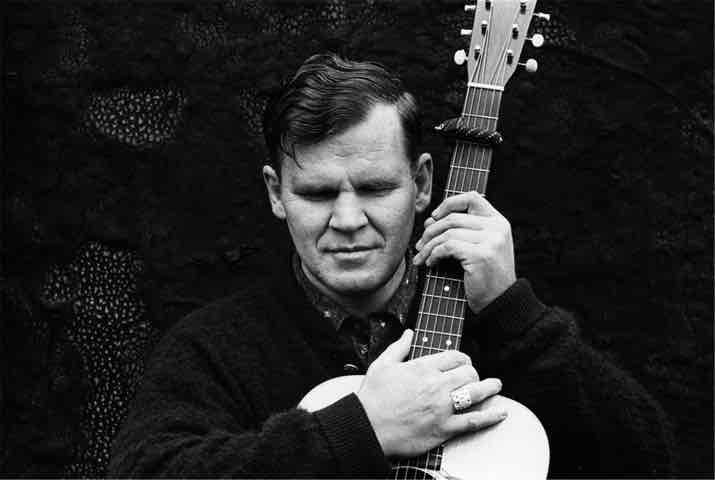
DOC WATSON
Doc Watson was a living legend in acoustic music, blending his traditional Appalachian folk music roots with blues, country, gospel, and bluegrass to create his unique style and expansive repertoire. Blind from infancy, Doc spent his lifetime making music and was considered by fans everywhere one of the world’s most accomplished flat-pickers.
Arthel Lane “Doc” Watson was born in Stoney Fork Township, near what is now Deep Gap, NC, on March 3, 1923, into a family with a rich musical tradition. His mother, Annie Watson, sung traditional secular as well as religious songs, and his father, General Watson, played the banjo. Doc’s early instrumental experience was with harmonica and a homemade banjo, but at age thirteen he taught himself the chords to “When the Roses Bloom in Dixieland” on a borrowed guitar. This impressive accomplishment created the impetus for his father eventually buying Doc his first guitar..
Armed with his new $12 Stella guitar, Doc began playing both traditional family tunes as well as new material he learned from records and the radio. For a time, Doc played mostly with “musical” neighbors and family, among them fiddler Gaither Carlton, who became his father-in-law when Doc married Rosa Lee Carlton in 1947. Doc and Rosa Lee Watson had two children, Eddy Merle, named after guitar great Merle Travis, and in 1951, Nancy Ellen.
Throughout the 1950’s, Doc supported his family by playing music, tuning pianos, and with great reluctance, accepting some financial aid for the blind.
He worked primarily in a country dance band, playing an electric guitar (a Gibson Les Paul model) with pianist Jack Williams. Also during this period however, he continued to play the traditional acoustic music of his home with good friends Tom “Clarence” Ashley, Clint Howard, and Fred Price, who were all accomplished musicians in their own right. It was while performing with Ashley, Howard, and Price at Union Grove, North Carolina in 1960 that the now legendary meeting of folklorist Ralph Rinzler and Doc Watson took place.
By 1961, Rinzler was able to convince Doc to join Ashley, Howard and Price in New York City for a “Friends of Old-Time Music” concert, and one year later Doc performed alone for the first time at Gerde’s Folk City in Greenwich Village. For the next several years, Doc made the folk music circuit, playing concerts and hootenannies all over the country and appearing at the 1963 Newport Folk Festival and with Bill Monroe that same year at New York’s Town Hall.
Although the folk revival had begun to die down by the mid-sixties, and with it some of the enthusiasm for “traditional” performers, Doc’s son Merle provided him with the musical and emotional companionship that he needed to continue touring. With Merle playing backup guitar and serving as manager and driver, the father-son team performed frequently. They often spent up to three hundred nights a year on the road, and consequently expanding their audience nationwide.
Doc has recorded dozens of albums in his long career and, although he stopped performing briefly after Merle died in 1985, he did continue to perform sporadically. Sadly, Doc passed away in May 2012.